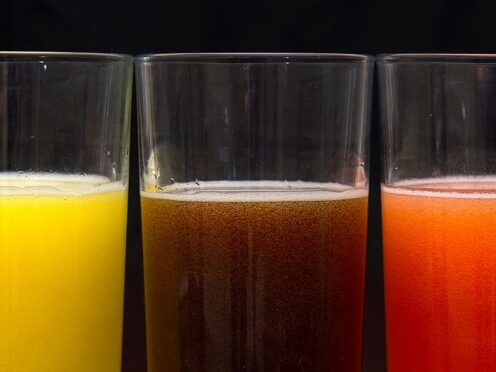
Drinks containing added sugar or artificial sweeteners may be associated with an increased risk of developing a heart condition that raises the risk of stroke, research suggests.
An analysis of data from more than 200,000 UK adults has found people who said they drank two litres of low-calorie drinks – with sweeteners such as sucralose, aspartame, saccharin or acesulfame – every week had a 20% higher risk of atrial fibrillation (AF), which causes irregular heartbeat.
And those who drank similar amounts of beverages containing added sugar – with ingredients such as white sugar, sucrose or syrup – had a 10% higher risk of AF, according to the study published in the journal Circulation: Arrhythmia and Electrophysiology
Meanwhile, consuming a litre of pure juice per week – such as 100% orange or vegetable juice – was found to be associated with an 8% lower risk of AF.
Lead study author Dr Ningjian Wang, a researcher at the Shanghai Ninth People’s Hospital, said: “Our study’s findings cannot definitively conclude that one beverage poses more health risk than another due to the complexity of our diets and because some people may drink more than one type of beverage.
“However, based on these findings, we recommend that people reduce or even avoid artificially sweetened and sugar-sweetened beverages whenever possible.
“Do not take it for granted that drinking low-sugar and low-calorie artificially sweetened beverages is healthy, it may pose potential health risks.”
In the UK, the Government recommends adults should have no more than 30g of sugar a day – roughly equivalent to seven sugar cubes.
For the study, the researchers looked at the health data of 201,856 people in the UK Biobank – a database containing medical and lifestyle records of more than half a million people.
During the nearly 10-year follow-up period, there were 9,362 cases of AF.
Those who consumed fizzy drinks or squash containing artificial sweeteners were more likely to be female, younger, have a higher body mass index (BMI) and a higher prevalence of type 2 diabetes, the researchers said.
Meanwhile, people who had sugary drinks were more likely to be male, younger, have a higher BMI, a higher prevalence of heart disease and lower socioeconomic status, the team added.
The scientists also found smokers who drank more than two litres per week of sugary drinks had a 31% higher risk of AF, compared with former smokers or those who never smoked.
The researchers said milk, tea, and coffee were not considered as sweetened drinks in the study as these “are usually evaluated separately due to their specific nutritional value”.
Dr Wang said that while the mechanisms linking sweetened drinks and AF risk still remain unclear, there “are several possible explanations, including insulin resistance and the body’s response to different sweeteners.”
Penny M Kris-Etherton, an emeritus professor of nutritional sciences at Penn State University in the US and a member of the American Heart Association nutrition committee, said: “While there is robust evidence about the adverse effects of sugar-sweetened beverages and cardiovascular disease risk, there is less evidence about adverse health consequences of artificial sweeteners.
“We still need more research on these beverages to confirm these findings and to fully understand all the health consequences on heart disease and other health conditions.
“In the meantime, water is the best choice, and, based on this study, no- and low-calorie sweetened beverages should be limited or avoided.”
Commenting on the research, Victoria Taylor, senior dietician at the British Heart Foundation, said that more studies are needed to have a definitive answer on the link between AF and sweetened drinks.
She added: “We already know that diets high in sugar are linked to high calorie diets which can cause weight gain and obesity.
“In turn, this increases the chances of developing type 2 diabetes and heart and circulatory diseases.”
Ms Taylor said: “With sugar sweetened drinks being one of our top sources of sugar in our diets, cutting back on these is a good place to start to reduce your intake.”
Naveed Sattar, professor of metabolic medicine at the University of Glasgow, said: “This is interesting but as the authors say, the work is a long way from proving drinking artificial sweetened drinks ’cause’ AF.
“Even though the authors tried to adjust for many factors, there is a strong chance that other behavioural aspects linked to drink behaviour could be more relevant as a cause of AF rather than the drinks themselves.”

Enjoy the convenience of having The Sunday Post delivered as a digital ePaper straight to your smartphone, tablet or computer.
Subscribe for only £5.49 a month and enjoy all the benefits of the printed paper as a digital replica.
Subscribe